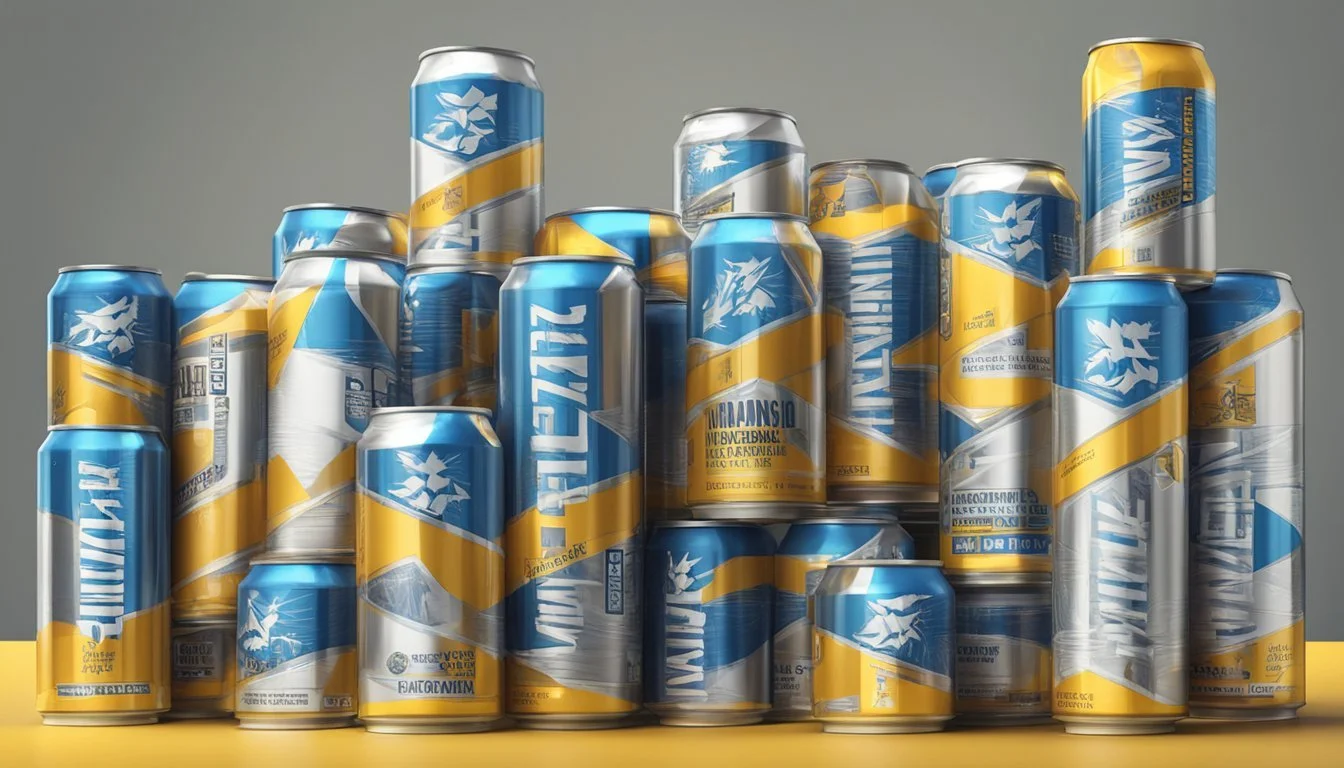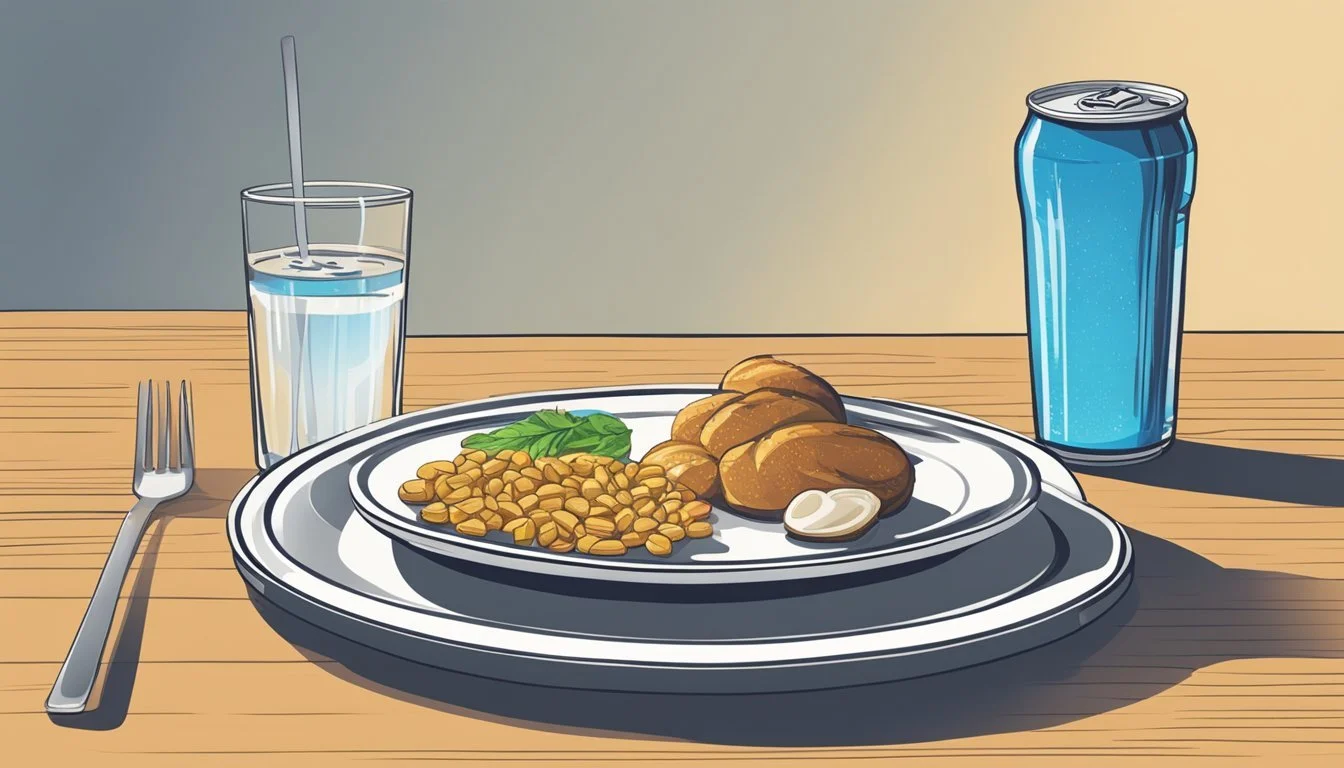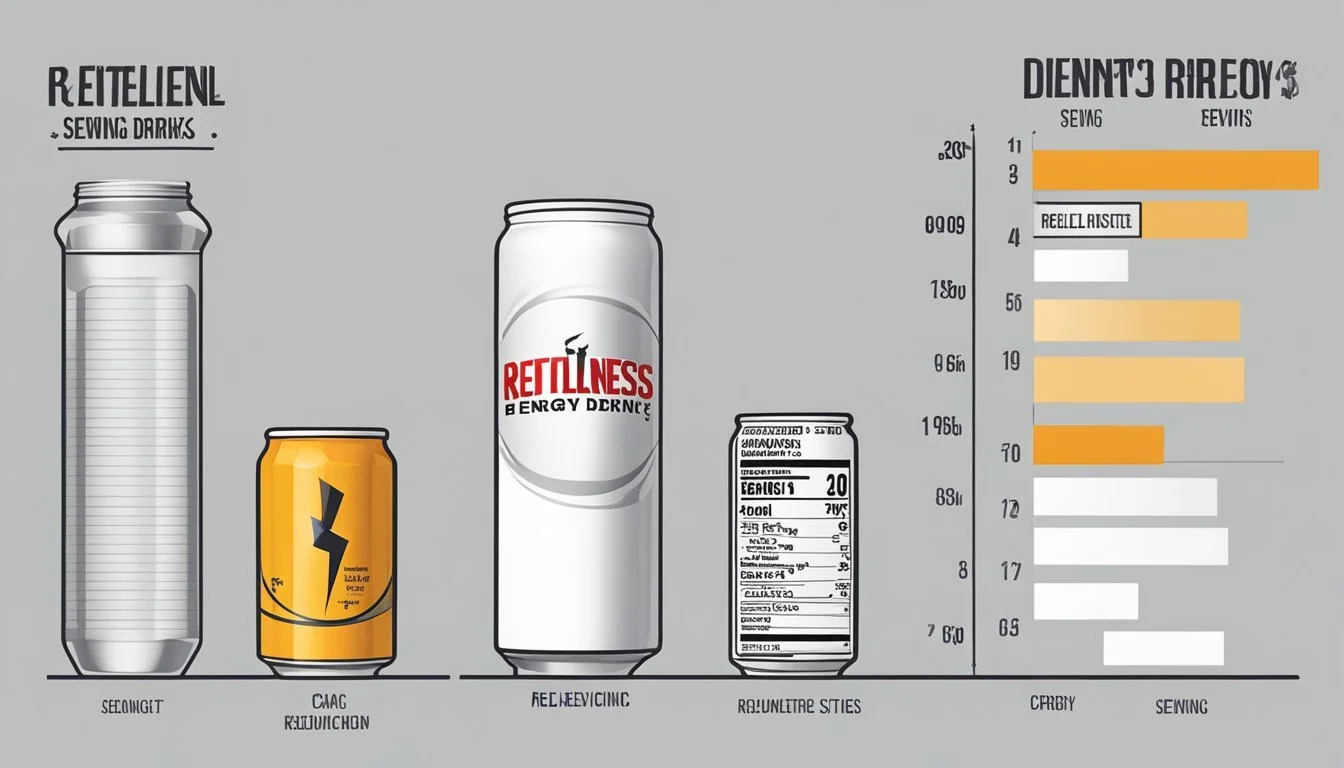How Many Servings of Relentless Is Too Much
Expert Guidelines
For those who rely on energy drinks to power through their day, understanding the balance between effectiveness and safety is crucial. Relentless, a popular energy drink in the UK, offers a significant boost with its caffeine content. A serving of Relentless contains 160mg of caffeine, and experts recommend not exceeding 400mg per day for healthy adults. This means limiting yourself to no more than two cans daily, ensuring you account for other caffeine sources as well.
Moderation is key in maintaining overall health. Consuming more than the recommended servings can lead to side effects such as increased heart rate, insomnia, and jitters. For those conscious about their dietary choices, it's important to incorporate Relentless into a balanced diet that prioritizes healthy eating habits.
Understanding the recommended servings helps not only in staying within safe consumption limits but also in promoting a lifestyle supportive of long-term well-being. Balancing energy drinks like Relentless with nutritious food and appropriate hydration is essential for staying both alert and healthy.
Understanding Relentless
Relentless Energy Drink is popular for its fruity flavors and vibrant branding. It’s essential to analyze its ingredients and nutritional profile, compare it with other energy drinks, and understand its caffeine content and recommended serving sizes.
Ingredients and Nutritional Profile
Relentless Energy Drink contains a blend of ingredients designed to boost energy. The primary ingredients include carbonated water, sucrose, glucose syrup, taurine, caffeine, and various B vitamins like niacin (B3), riboflavin (B2), and B6.
Nutritional content per 500 ml can:
Calories: 200-250 kcal
Carbohydrates: 45-55 g (mostly from sugars)
Fat: 0 g
Protein: 0 g
Sodium: a negligible amount
The high sugar content provides a quick energy boost. B vitamins help in energy metabolism, while taurine is believed to support neurological development and regulate water and mineral levels in the blood.
Classifying Relentless Among Other Energy Drinks
Relentless falls into the category of high-caffeine, sugary energy drinks. Unlike sugar-free alternatives such as Red Bull Sugarfree, Relentless maintains its appeal with a variety of sweet flavors.
Comparative aspects:
Red Bull (250 ml): 110 kcal, 27 g sugar, 80 mg caffeine
Monster (500 ml): 230 kcal, 54 g sugar, 160 mg caffeine
Relentless (500 ml): 200-250 kcal, 45-55 g sugar, 160 mg caffeine
Relentless offers a similar calorie and sugar profile as Monster, making it less suitable for calorie-conscious consumers. The consistency in its nutrient profile with other major brands ensures its competitive stance.
Caffeine Content and Serving Size
A 500 ml can of Relentless contains approximately 160 mg of caffeine. This is a moderate level, similar to Monster and roughly double that of a Red Bull can.
The recommended daily limit for caffeine intake is 400 mg. Therefore, consuming more than two cans of Relentless in a day may exceed this limit, potentially leading to side effects like jitters, insomnia, and increased heart rate. For safety, it’s best to limit intake to one can per day, especially for those sensitive to caffeine.
Given the high sugar content, frequent consumption may also lead to long-term health issues related to weight gain and dental health. Moderation is key to enjoying Relentless while managing its impact on overall health.
Health Implications of High Consumption
High consumption of Relentless can lead to various health issues, both in the short-term and long-term. Understanding these impacts is crucial for making informed decisions about how much to consume.
Short-Term Side Effects
Drinking excessive amounts of Relentless may cause anxiety and jitteriness due to its high caffeine content.
Weight gain can also occur as the extra calories from sugar-laden drinks add up quickly.
Heart palpitations are another concern, particularly for individuals sensitive to caffeine, potentially elevating heart health risks.
Some people may experience gastrointestinal issues, such as stomach upset or diarrhea, as a result of the artificial sweeteners and high sugar content in the beverage.
Long-Term Health Risks
Regular high consumption of Relentless poses serious long-term health risks.
Diabetes can develop due to sustained high blood sugar levels from regular intake. The risk for heart diseases increases as well, largely caused by the sugar and caffeine overload affecting cardiovascular functions.
Ongoing high intake impacts overall health, contributing to chronic weight gain, which in turn can lead to obesity.
Long-term nervous system stimulation from high caffeine levels can exacerbate anxiety disorders or lead to insomnia.
In essence, continuous high consumption can deeply influence general well-being and elevate the risk of developing multiple chronic conditions.
Dietary Guidelines and Servings
Understanding dietary guidelines and recommended servings is crucial for maintaining balanced nutrition and health. This section will break down the recommended daily intake and explain serving sizes to help individuals make informed decisions.
Recommended Daily Intake
The Dietary Guidelines for Americans, 2020-2025 emphasizes that people need a balanced diet that varies based on age, sex, and physical activity level. Each food group has specific recommended daily servings to promote overall health and prevent chronic diseases. For example:
Vegetables: 2.5 cups/day
Fruits: 2 cups/day
Grains: 6 ounces/day, half of which should be whole grains
Protein Foods: 5.5 ounces/day
Dairy: 3 cups/day
These guidelines aim to ensure that people receive the essential nutrients needed for daily activities and long-term well-being. It's essential to distribute these servings across all meals and snacks throughout the day.
Understanding Serving Sizes
Serving sizes can be confusing, but they are crucial to adhering to dietary recommendations. A serving size is a standardized amount of food that helps people understand how much they are consuming. Here's a quick reference for some common food items:
Vegetables: 1 cup of raw or cooked vegetables
Fruits: 1 cup of fruit or 100% fruit juice
Grains: 1 slice of bread or 1 cup of ready-to-eat cereal
Protein Foods: 1 ounce of meat, poultry, or fish; 1 egg
Dairy: 1 cup of milk, yogurt, or fortified soy beverages
Using these standard serving sizes, individuals can better manage their daily intake. Measuring out portions according to these sizes can help avoid overeating and ensure a balanced diet.
Factors Influencing Safe Consumption Levels
Safe consumption levels of Relentless depend on individual health and medical history, age and weight considerations, as well as activity level and lifestyle. These factors together determine how much of the product can be safely included in a person's diet.
Individual Health and Medical History
Medical history plays a crucial role. Individuals with underlying health conditions such as hypertension, diabetes, or cardiovascular issues should be cautious. The American Heart Association recommends monitoring caffeine intake, which is relevant since energy drinks often contain high amounts of caffeine.
For those with gastrointestinal issues, high amounts of dietary fiber can be problematic. Therefore, it's essential to consult a healthcare provider to determine safe limits based on personal health records.
Age and Weight Considerations
Age affects metabolism. Younger individuals may process substances differently than older adults. For instance, children and teenagers should consume lower quantities due to their developing bodies and increased sensitivity to caffeine and sugars.
Weight also matters. Heavier individuals may tolerate more. Research suggests that body mass influences how substances are metabolized. Therefore, safe consumption levels should be adjusted accordingly.
Activity Level and Lifestyle
An active lifestyle requires more energy. Athletes or those with demanding physical jobs may need higher intake levels for sustenance. However, excessive caffeine can negatively impact hydration and electrolyte balance, crucial for high activity levels.
Conversely, sedentary individuals may not require as much. Dietary fiber intake recommendations also vary; active individuals benefit more from the sustained energy it provides. Tailoring consumption to individual lifestyle and physical demands ensures safety.
Alternatives to High Energy Drink Intake
Reducing the intake of high-energy drinks can benefit health significantly. There are several natural and more balanced alternatives that can provide energy without the drawbacks associated with excessive caffeine and sugar.
Healthy Natural Stimulants
Green Tea: Green tea contains a moderate amount of caffeine and a compound called L-theanine that promotes alertness without jitters.
Yerba Mate: This South American beverage offers a balanced lift in energy and is rich in antioxidants.
Smoothies: Blending fruits and vegetables into a smoothie provides vitamins, minerals, and natural sugars for a healthy energy boost.
Protein Foods: Foods like nuts, seeds, and Greek yogurt deliver sustained energy through protein and healthy fats.
Complex Carbohydrates: Whole grains and oats release energy slowly, preventing spikes and crashes in blood sugar.
Balancing Diet without Excessive Caffeine
Eat Regular Meals: Consistent meals with a mix of protein, healthy fats, and complex carbs help maintain energy levels.
Hydration: Drinking plenty of water is crucial. Dehydration often leads to fatigue. Consider adding a splash of fruit juice for flavor and additional vitamins.
Healthy Diet: Incorporating a balanced diet rich in fruits, vegetables, and whole grains supports overall vitality and energy.
B Vitamins: Foods such as eggs, nuts, seeds, and leafy greens are high in B vitamins, which are essential for energy production.
Choosing these alternatives not only sustains energy levels but also avoids the negative health impacts associated with high intake of energy drinks. Proper diet and hydration can naturally enhance alertness and overall well-being.
Identifying Signs of Overconsumption
Consuming too much of the energy drink Relentless can lead to both physical and psychological symptoms. It is important to recognize these signs early to avoid adverse health impacts.
Recognizing Physical Indicators
Overconsumption of Relentless can manifest in various physical symptoms. Gastrointestinal issues such as bloating, gas, and stomach cramps are common. Additionally, swelling in the ankles and feet might occur due to high sodium content.
People may also experience headaches and dizziness triggered by excessive caffeine intake. Heart palpitations and increased heart rate can be alarming signs that require immediate attention.
Recognizing Psychological Indicators
Psychological signs of drinking too much Relentless often include anxiety and restlessness. Caffeine can significantly impact mental health, leading to irritability and difficulty concentrating.
Some individuals might struggle with insomnia or disrupted sleep patterns due to high caffeine levels. Mood swings and heightened stress responses are other indicators to watch for, as they can severely impact daily life and overall well-being.
Expert Opinions and Dietary Recommendations
Examining expert views and established dietary guidelines can provide clarity on how much Relentless, an energy drink, is safe to consume. Insights from registered dietitians and recommendations from health organizations can offer invaluable guidance for healthy consumption.
Registered Dietitian Insights
Registered dietitians highlight the importance of understanding the caffeine content and sugar levels in Relentless. They advise that the high caffeine content, typically around 160 mg per can, can lead to negative health effects if consumed excessively.
Dietitians recommend limiting intake to one can per day. Excess consumption can lead to jitteriness, insomnia, and increased heart rate. Sugar content is another concern, with one can containing around 50 grams, matching the upper limit advised by many health agencies.
In comparison with nutrient-dense foods, Relentless lacks vitamins, minerals, and healthy fats. Prioritizing whole foods and lean meats can offer more balanced nutrition.
Guidelines by Health Organizations
Prominent health organizations such as the American Heart Association (AHA) provide guidelines that can help in setting limits on energy drink consumption. The AHA recommends a maximum daily sugar intake of 36 grams for men and 25 grams for women. A single can of Relentless exceeds these limits.
Health organizations also emphasize the importance of nutrient-dense foods and avoiding excessive intake of stimulants like caffeine. They advise replacing high-sugar, high-caffeine beverages with healthier alternatives.
Healthy fats and lean meats are strongly recommended as part of a balanced diet to ensure proper nutrient intake and avoid the potential negative effects of energy drinks.
These guidelines stress the importance of moderation and considering the broader context of an individual's diet and health requirements.
Strategies for Consumption Management
Balancing the intake of Relentless with a healthy lifestyle is crucial. Key strategies include maintaining a balanced diet and monitoring overall health and activity levels.
Establishing a Balanced Lifestyle
Moderation: Consuming Relentless in moderation is essential. While it may provide an energy boost, it's important not to exceed recommended servings. Excessive intake can lead to health issues like increased heart rates and anxiety.
Balanced Diet: Complement Relentless consumption with a diet rich in fruits, vegetables, and legumes. Including leafy greens can mitigate potential negative effects by providing essential nutrients.
Activity Level: Adjust Relentless intake according to your activity level. Higher physical activity may justify occasional increased consumption, but sedentary lifestyles require stricter moderation.
Overall Health: Regular check-ups can help monitor health indicators affected by energy drink consumption. Maintaining consistent hydration and avoiding late-day consumption can prevent sleep disruption and ensure long-term wellness.
Utilizing these strategies ensures a manageable intake of Relentless, supporting both energy needs and health.









